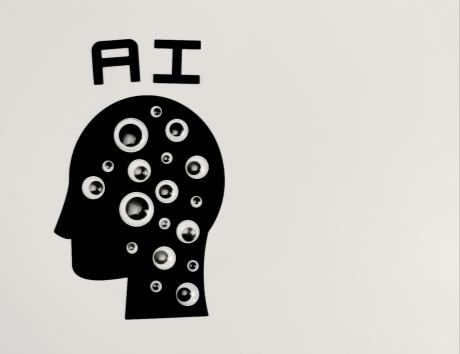AI Cover Letters: Are They Worth It?
Artificial intelligence is a branch of computer science concerned with using machines to simulate human cognitive abilities. Popular tools like ChatGPT, which generates content based on human prompts, have become increasingly common in many professions. These applications can be useful for handling many professional tasks, including creating job application materials like AI cover letters.

Is it acceptable to use AI tools to make a cover letter?
Across all sectors and industries, people are using AI tools to enhance their work. As these tools become more commonplace, employers have warmed up to the idea of their team members using them to improve efficiency and productivity.
Although employers frequently use AI in the hiring process, it’s less clear whether they approve of candidates using ChatGPT cover letters. Employers tend to fall into two main schools of thought regarding this issue.
Anti-AI Employers
Employers who are against using AI to write a cover letter often cite the fact that AI-generated content can contain factual inaccuracies. If applicants don’t fact-check their cover letters before submission, they may end up with a finished product that doesn’t accurately reflect their background, experience, and personal traits.
Additionally, some employers believe using AI tools to write a cover letter is too easy or even deceptive.
Pro-AI Employers
To other employers, an applicant’s use of AI shows that they’re in tune with the world around them and willing to embrace innovation, creativity, and change.
Furthermore, while all hiring managers regard cover letters as important, many recognize that they’ll have an opportunity to learn more about a candidate’s background and skills during the interview. In other words, if you’ve misrepresented yourself in any way, they’ll find out later.
What are the pros and cons of using AI tools to write a cover letter?
This mixed reception leads many applicants to wonder whether they should be using AI tools for writing a cover letter. Here are a few things worth thinking about if you’re considering creating a cover letter with ChatGPT or a similar tool.
Pros
- Save Time: Instead of worrying about writer’s block, you can simply paste the job description into your prompt and have the tool create a keyword-rich first draft
- Be Professional: Because AI relies on computers, it can help you maintain a professional tone and keep you from coming across as overly familiar or personal
- Polish Your Letter: AI can help you spot grammatical errors you otherwise wouldn’t have seen and offer suggestions for word choice and formatting
- Hone Your Skills: AI tools can generate examples of sound writing to help you improve your cover letter-creation skills
Cons
- Lack of Personal Knowledge: AI doesn’t know your personal background or work experience and may therefore introduce inaccuracies
- The Need to Proofread: While AI can be great for helping you generate content, you’ll still need to proofread it prior to submission to catch any errors that may have slipped in
- Limited Customization: Depending on the industry you work in, ChatGPT may not know enough about what you do to tailor your cover letter appropriately
Using AI tools to generate cover letter templates can undoubtedly be convenient in many ways. Being aware of these issues will help you proceed cautiously when using AI to write a cover letter.
Expert Tip:
Tips on using AI tools to create a cover letter
If you’re determined to use AI tools to create a cover letter, it’s important that you do so effectively. Here are five essential cover letter tips that can help you make the most of generative AI tools as you set out to create an attention-grabbing application package for your job search.
1. Create effective prompts
Anytime you use an AI tool, it’s important to keep in mind that the quality of its output will depend directly on the quality of your input. To write a good cover letter, you’ll want to give ChatGPT the following details:
- Purpose
- Structure
- Tone
- Length
- Key topics
- Target audience
While this may seem like a lot, the more specific you are, the better your results will be.
2. Use AI to determine the best layout
Generative AI writing assistants have been trained on large datasets, which means these tools know how to format many things. Knowing this, you can prompt your AI tools to write an outline for your industry-specific cover letter, which will give you a good basic cover letter structure to work with.
If you want to see cover letter examples already written in a specific format, you can ask ChatGPT or another AI tool to create one for you to use as a reference point.
3. Ask ChatGPT about common skills and experience
While your preferred AI tool will know your personal history, it can generate a list of the most important skills or types of experience employers in your field are looking for. It can then show you how to incorporate this information into your cover letter in a compelling way.
It bears repeating that you must fact-check your cover letter before sending it to any employer. Doing so will ensure that all information about your skills and experience accurately reflects your professional background.
4. Use keywords to write ATS-optimized documents
Many employers use applicant-tracking systems (ATS) to filter out candidates who don’t meet their hiring criteria. Part of the way these systems accomplish this goal is by using AI to look for keywords in your resume and cover letter.
Using the job description for the role you’re applying for, ChatGPT and other tools can help you identify critical keywords and incorporate them into your cover letter and resume templates. Consequently, it will be easier for you to optimize your documents to make it past ATS and onto the hiring manager’s desk.
5. Tailor your application to the company and job opening
One of the best things about AI is that because it’s so efficient, you can use it to write as many ChatGPT cover letters and resume examples as you like without worrying about how long it will take.
Take advantage of ChatGPT’s wide base of industry knowledge and ask it to write a cover letter customized for the company or industry you're applying to. This will help you come across as passionate and enthusiastic.
"Anytime you use an AI tool, it’s important to keep in mind that the quality of its output will depend directly on the quality of your input."
ChatGPT/AI can help to create a compelling cover letter
In the modern age, more job seekers are using smart tools to create resumes and cover letters quickly and efficiently. Despite the growing ubiquity of AI tools, however, it’s important to tread carefully. ChatGPT and other generative AI tools are still relatively new, and no one yet understands their full potential.
As many cover letter articles convey, it’s vital that you commit to doing your own research.
Take some time to practice writing resumes and cover letters with these tools well before you actually apply for a job. Doing so will help you avoid the pitfalls that could ultimately keep you from landing the position you’ve always wanted.
Use AI wisely in your job search
Writing a ChatGPT cover letter may seem like a good idea, but it must be done carefully.
Check with your prospective employer to see if they have policies in place regarding candidates using generative AI tools in the application process. If the employer isn’t on board with the idea, consider using more traditional resources, such as cover letter templates, to get started.
Whatever you decide to do, make sure you always represent yourself honestly. Remember, you want your qualifications and personality to be what gets you hired for the role, not your reliance on impersonal technologies.
Did you know our cover letter builder comes with AI suggestions to help you out? Just give it some basic details, and it’ll offer tips tailored to your background and the job you’re applying for.
The same goes for our AI resume builder—it’s designed to give you personalized recommendations that highlight your skills and experience. But don’t worry—your documents won’t end up sounding like a generic AI template. They’ll still feel uniquely yours, just with a little extra guidance to make them stand out.
Download a perfectly written cover letter
Write a cover letter step-by-step with our intuitive generator.



